From Texas to Las Vegas, Esports Make a Splash In the Events Industry
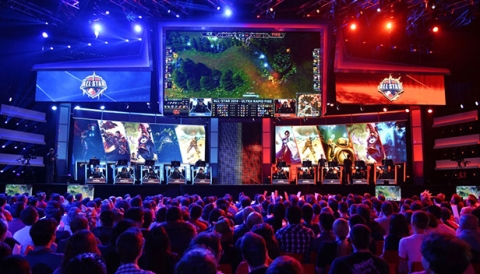
As event destinations search for more recession-proof market segments to generate strong economic impact for their communities, the convention industry is taking a serious look at the rapidly growing world of esports, aka competitive video gaming.
This year alone, the global esports industry is set to surpass the $1 billion mark, with no signs of slowing down anytime soon. And with many association and corporate events continuing to grapple with flat budgets and shrinking attendance, an exploding industry such as esports, with its broad appeal and growing fan base, has become all the more attractive to convention venues far and wide.
For those who aren’t familiar with esports, think popular in-home video games, such as Fortnite, League of Legends, Counter-Strike, Call of Duty, Overwatch, Minecraft and Madden NFL — in which people from all over the world play against each other in real-time. In the professional esports world, competitors from different leagues or teams play while millions of spectators from across the world watch on TV, online or live.
According to the 2018 Global Esports Market Report by market analytics company Newzoo, 380 million people watched esports last year, including 165 million esports enthusiasts — aka, frequent viewers.
“Esports is already on track to have a global monthly audience larger than Major League Baseball or the National Hockey League,” says Mike Hunter, director of convention and event services for the City of Arlington, Texas.
Across the country, cities are rallying around the esports phenomenon, betting big on this growing market segment with new venues, new technology and audiovisual infrastructure and more.
From Data to Reality in Arlington
Arlington is one city that understands the gaming craze-turned-spectator sport. In fact, it took a big risk last year in partnering with Esports Venues LLC to convert the Arlington Expo Center ballroom into Esports Stadium Arlington. It became the city’s first esports arena and North America’s largest dedicated esports venue.
According to Matt Wilson, vice president of sports and events for the Arlington CVB and executive director of Arlington Sports Commission, the city began taking a serious look at esports more than five years ago when it noticed an uptick in esports activity in cities around the country.
They partnered with New York University’s Preston Robert Tisch Institute for Global Sport to conduct research resulting in a white paper suggesting that the time was now to invest in the rapidly growing market segment.
“Around the same time, our mayor was having discussions with other mayors about what was happening in other cities, and [esports] was something that continued to bubble up to the top,” Wilson says. “One of the owners of the Texas Rangers purchased an esports team and was looking for a home for it, and we had a convention center that fit the description of what they were looking to do — so we saw an opportunity.”
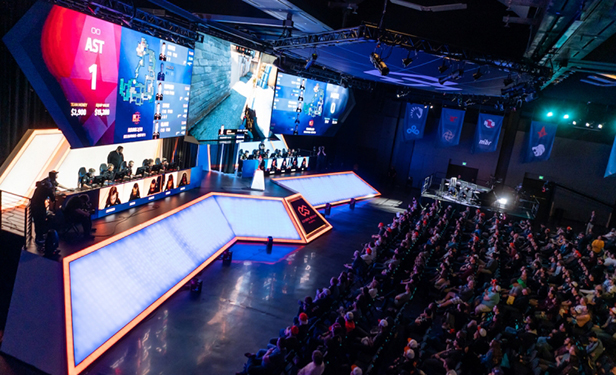
The rest is history. Announced in early 2018, Arlington’s $10 million, 100,000-square-foot esports arena opened just in time to host the Esports Championship Series Season 6 last November. It has hosted close to 100 esports events since.
Retaining its ballroom functionality for regular events, the revamped space features a permanent competition stage and built-in audiovisual technology including an 80-foot LED screen, production lighting and sound. Surrounding meeting rooms have been transformed into team and green areas, and production and holding rooms for talent as they’re waiting to compete. There’s even a performance area where gamers train and learn about nutrition and sleep habits, Wilson says.
In addition, the venue’s pre-function area has been repurposed into a gamer gallery featuring 90 competition workstations open to the public seven days a week. The arena also houses local and small regional esports tournaments and league competitions.
“This isn’t just pipe-and-drape and slapping some logos on the wall — this is a dedicated space with state-of-the-art sound and visuals, painted in a matte black so that you can darken it for optimal game viewing,” Wilson explains. “There are other facilities around the country that are deemed esports stadiums, but [we have] everything you need to do in the ecosystem of esports all in one spot.”
While there are tentative plans on the horizon for a new convention center in Arlington, the Expo Center remains open for convention business, Wilson adds.
Finding the Right Gaming Mix in Dallas
Just a few miles east of Arlington, Dallas has also been luring esports business. It recently hosted DreamHack, a gaming lifestyle festival that attracted 31,000 people and spanned 300,000 square feet of exhibit space and the arena at Kay Bailey Hutchison Convention Center from May 31-June 2.
Since 2012, Dallas has been home to major esports tournaments including Major League Gaming Pro Circuit, Call of Duty World, Gears of War and Minecraft Minefaire, according to Monica Paul, executive director of the Dallas Sports Commission.
Paul and her team have kept a close watch on the rise of esports over the last eight years, but particularly in the last three, when the market began to boom into such a large – and lucrative – sports segment. However, as appealing as this phenomenon might be, cities still have to evaluate whether these events are going to drive the right attendance, economic impact and room night numbers to make hosting them worth it, Paul emphasizes.
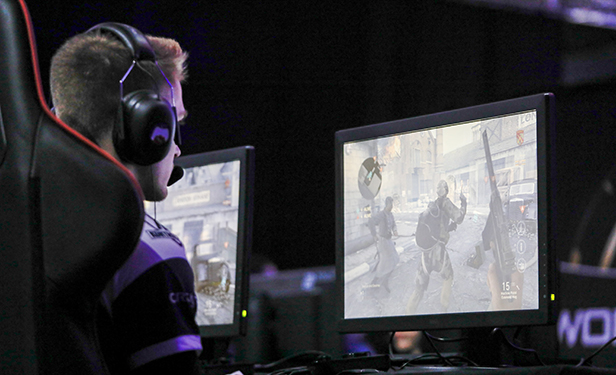
“We’ve been approached a lot [by esports events], and it’s been our job to figure out which ones are legit and which are going to hit on our goals — whether it be in attendance, economic impact or room night metrics,” says Paul.
She and her team work with Smart City Networks, KBHCC’s telecommunications and internet provider, often a year in advance to get a clear picture of each esport group’s requirements so the convention center able to meet their specific needs when showtime arrives.
Not only do these events have much greater broadband and electrical needs than the average conference or trade show, but also often come with their own operations and production crews, Paul explains.
In attracting esports business, Dallas has an advantage of being in a region replete with good partners in the esports space, with cities including Arlington and Frisco becoming hotbeds for new teams, leagues and venues. Case in point: the new GameStop Performance Center, an 11,000-square-foot esports facility developed by Complexity Gaming, one of the oldest U.S. esports organizations owned by Dallas Cowboys owner Jerry Jones.
“You’re seeing companies making investments in esports, not only from a technology side but also from a sponsorship side, you’re seeing teams and leagues popping up, and teams building their own arenas like basketball and hockey teams have,” Paul explains. “With all the sponsorship and investor money and seeing who’s investing in it, esports is going to remain high on our bucket list.”
In San Diego, Infrastructure Matters — But So Does Culture
Well-versed in hosting large fan-based events such as ComicCon, the San Diego Convention Center is actively pursuing the esports market, too — so much so that it upgraded its broadband infrastructure for that exact purpose.
For the second time, SDCC will be hosting TwitchCon, a bi-annual gaming convention produced by the live streaming video platform Twitch.tv, in September. During their first event at the venue, in 2016, they took up 1.5 exhibit halls. This year, they’ll occupy four or five.
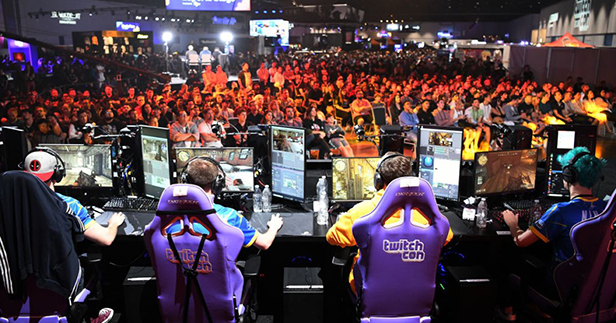
“[TwitchCon is] 10-fold of what it was three years ago in terms of attendance and expectations of size and draw,” says Rip Rippentoe, SDCC’s president and CEO. “In my career, I’ve not seen a show blast off like this one has.”
Betting big on the future of TwitchCon and other esports events, SDCC recently upgraded the fiber optics system throughout three of its older exhibit halls. This move, along with the overall appeal of the oceanfront destination, helped the facility secure TwitchCon for ’20 and ’21. Yet it’s not only the technology requirements that make esports and SDCC a good match for each other.
“The fact that we have had festival-type events like ComicCon where the community embraces that kind of vibe makes a difference,” Rippentoe says. “Being able to find that compatibility between the destination and the show is just as important as making sure that the broadband capability and the integrity is there.”
Channeling a “Gaming Lifestyle” in Las Vegas
As the No. 1 trade show destination in the U.S., Las Vegas is also hopping aboard the esports train — a natural transition for a city already well-versed in the gaming world.
MGM Resorts began hosting major esports events several years ago, taking an aggressive leap into the space by building HyperX Esports Arena at The Luxor in partnership with Allied Sports in 2017.
“We were looking [for] other revenue sources that could help us diversify our entertainment options,” says Neil Johnson, director of global sales for MGM Resorts. “We saw [esports] as a wave coming, and we had a great venue where we thought if we had a proven partner, we could retrofit the space [into an esports arena].”
In addition to HyperX, the company also can host esports events in T-Mobile Arena, MGM Grand Garden Arena, and Mandalay Bay Events Center and Theater.
But there’s more to MGM’s esports strategy than luring in leagues and teams to the new arena and other Vegas properties. According to Johnson, the company is developing offerings that appeal to the overall gaming lifestyle.
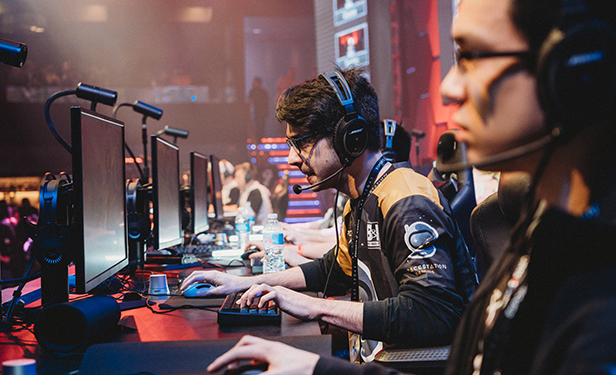
“The esports community right now is 300 million people worldwide, and in terms of revenues coming from this market, it’s about $900 million annually for esports,” Johnson says. “But if you’re looking at the larger ecosystem [of] gaming and lifestyle, that’s a $2 billion-per-year industry. So not only are we looking to host esports events but also have more of our properties indoctrinate a gaming type of culture and lifestyle.”
This includes working with esports “influencers” to experience MGM’s offerings, develop content and events, and incorporate the gaming subculture into its nightclubs, shopping, dining and nightlife.
“Corporate America has woken up to this phenomenon and they’re pumping dollars and investment into this market in unprecedented levels,” Johnson says. “These events bring in significant [revenue]…citywide events that are putting heads in beds and a market segment that’s new and growing.”
He adds, “You have a market that’s younger, that every brand is trying to market to and an audience that’s global and digital. I would be hard-pressed to find any brand out there that’s not trying to get in front of a group like that.”
Don’t miss any event-related news: Sign up for our weekly e-newsletter HERE and engage with us on Twitter, Facebook, LinkedIn and Instagram!


Add new comment